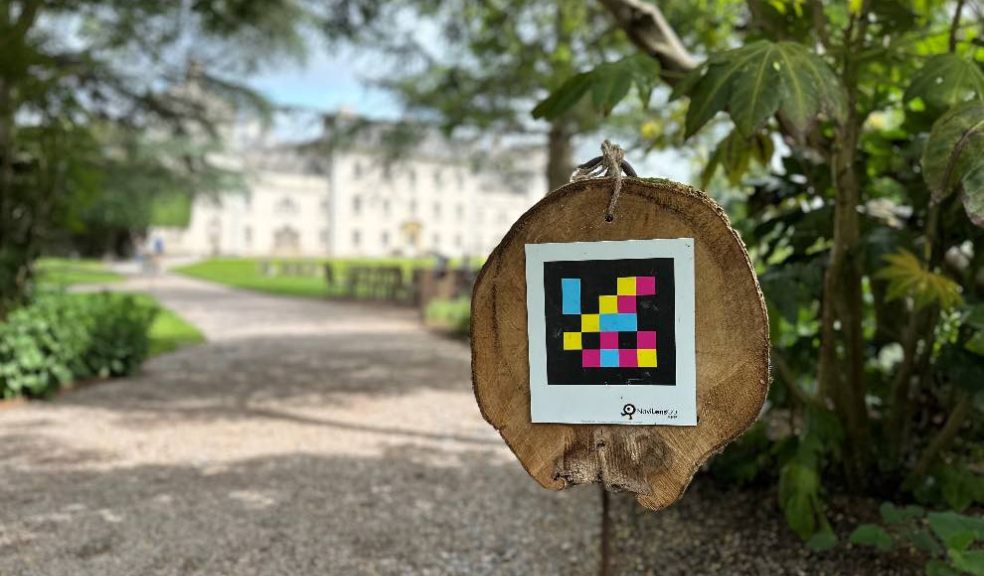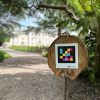
National Trust trials pioneering NaviLens technology to aid blind and partially sighted people
The National Trust will be trialling the use of a pioneering navigational app for partially sighted visitors at Saltram in Plymouth this summer to improve access to heritage and nature.
NaviLens is a free navigation app which can help give greater independence and freedom for users to navigate their way around places with less or even no aid.
The technology is currently in use on transport systems across Spain and in some parts of the USA and UK, as well as in some museums and food products in UK supermarkets.
The app uses QR-style codes that users can detect on their phones. Users point their phones in the general direction, and the NaviLens app picks up the codes in the vicinity. Each code has information loaded onto it, which is spoken out loud on the user’s phone (both Apple and Android), offering directions and warnings, and in this context, providing navigational and interpretative content relevant to Saltram’s historic garden setting.
The trial is designed for people who are partially sighted, with the aim of understanding how we can better support both blind and partially sighted visitors in accessing Saltram in the future.
Natalie Haly, Project Manager for the National Trust at Saltram said: "This trial is incredibly exciting as it marks a first for the National Trust, and we are thrilled that it's happening right here in Plymouth. It allows us to explore how this innovative technology can enhance our visitors' access to heritage and nature. This initiative is a significant step in our ongoing journey to ensure everyone feels truly welcome at Saltram."
The codes are placed along a pre-determined route throughout the garden, allowing users to experiment with the technology in a controlled setting. This route was tested by the RNIB and a user tester group with lived experience in May. It has been found that the app provides blind and partially sighted individuals with greater independence in spaces they might not have otherwise explored.
Now, a public trial will run until 25 October. Funded by the National Lottery Heritage Fund, this trial aims to improve our understanding of how we can increase access to heritage and nature at Saltram.
Natalie added: "We are currently in the testing and trial phase of the project, where our goal is to understand what works well and best supports our audiences. We have the unique opportunity to pilot NaviLens at Saltram on behalf of the National Trust to determine if this technology is effective in a heritage setting.”
“We are also assessing whether NaviLens specifically enhances the experience for Saltram's visitors, particularly those who are blind or partially sighted.”
“This trial supports our commitment to ensuring everyone feels welcome and included at Saltram."
During the trial of the NaviLens technology, the RNIB user group expressed their enthusiasm and positive feedback. Both participants felt more confident and appreciated the reduced dependency on others for information, highlighting the potential of NaviLens to enhance their independence.
They found the technology very interesting and expressed a desire to see it implemented in more National Trust locations and other places. Comments from the user group included: 'I like it, it is very good,' 'I like it because it is clear,' and 'I like the history information.'
One user particularly appreciated the ability to independently access all menu options for our Chapel Tea Room without needing someone to read them out: 'Not having somebody to read the menu out to you and ask you what do you fancy? I want to know what there is, all of it.'
A spokesperson for NaviLens said: “NaviLens is thrilled to work with the National Trust at Saltram to enhance the visitor experience for those who are blind or partially sighted. By integrating NaviLens’ innovative technology in this pilot, we are helping to make Saltram’s rich history, architecture, and grounds accessible to everyone.”
“NaviLens codes can be scanned from much further away than regular codes and can be detected from wide angles and while on the move. Additionally, the information is automatically translated into 37 different languages, benefiting global visitors as well. This collaboration not only enhances inclusivity but also enriches cultural engagement for all visitors.”
The NaviLens trial is the latest in a series of projects delivered by Saltram as part of the National Trust’s aim to connect more people with nature and heritage. In July 2023, Saltram was granted £240,000 from The National Lottery Heritage Fund for development phase works, which has led to the testing and trialling of numerous capital and activity projects at the estate, including NaviLens. Natalie said: “The projects will explore ways to protect our historic environment, open more spaces for public engagement, and encourage our target audiences to explore more of the estate. By removing barriers that might make people feel Saltram isn’t for them, we aim to create a more inclusive and welcoming experience for all visitors.”
The National Trust will be looking to submit a further funding bid in early 2025 to deliver on this exciting ambition.
For more information visit https://www.nationaltrust.org.uk/future-saltram
Photo @National Trust Images.














